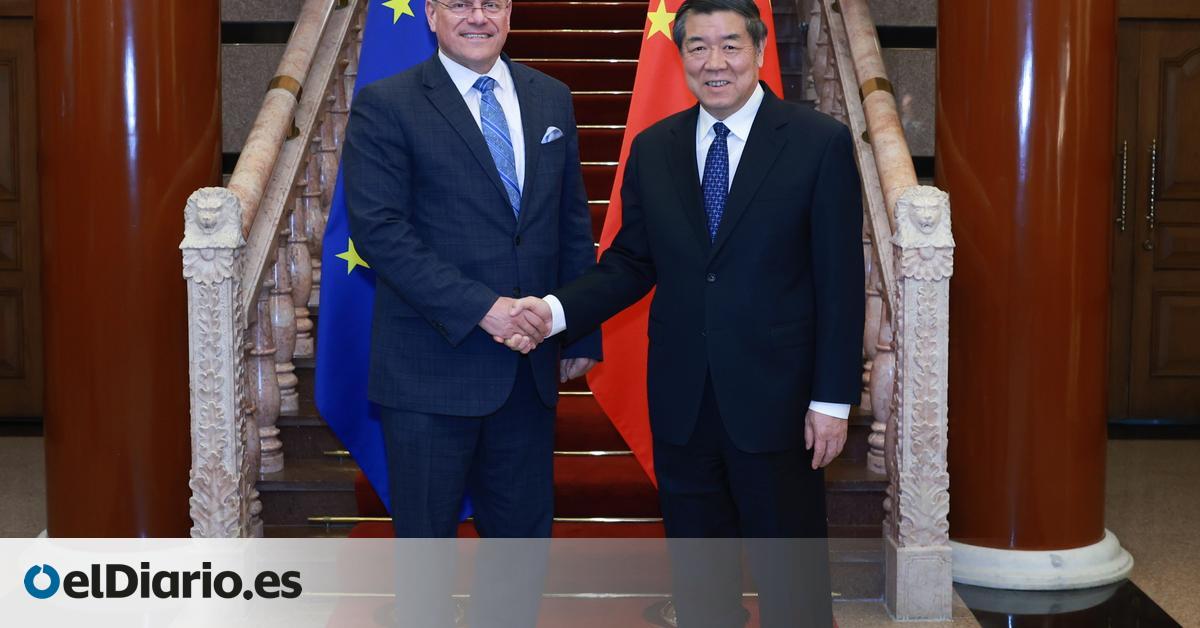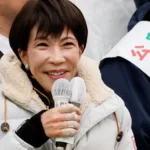
The commercial war unleashed by Donald Trump threatens the world economy with less growth and greater inflation. Practically, all powers are in the Diana of Washington and the pieces of the commercial board are forced to reconfigure. With that framework, the relationship of the European Union and China, which has always been convulsed.
The EU defines the Asian giant as a “partner, competitor and systemic rival” and, based on that contradictory rating, calibrates its ties. In recent times, relationships have suffered an escalation of tension, especially for tariffs on the Chinese -manufacturing electric car, whose subsidies were unfair competition with the community market, and Beijing’s reaction against products such as pork – vital in the case of exports of Spain -, dairy or brandy, which struck France especially.
In full challenge of Trump, the Commissioner of Commerce, Maros Sefcovic, traveled to Beijing to “promote a more balanced and cooperative commercial relationship.” After the contentious by electric vehicles, chips, discrimination in the health market or solar energy, among others, the intention of the European Commission was to address a relationship based on “equal conditions” and the “symmetrical opening of markets.”
SEFCOVIC will inform the trade ministers of the results of these conversations at an extraordinary meeting in Luxembourg this Monday in which the main course will be, however, the EU response to Trump’s blow. What the commissioner agreed with the Vice Primer Chinese Minister, He Lifeng; The Minister of Commerce, Wang Wentao, and the Minister of Customs, Sun Meijung, was to “carry out a narrow monitoring” of “key” themes, such as electric vehicles, supply chains or create a work group on access to the agri -food market and study a possible roadmap for the review of the Customs Cooperation and Mutual Assistance Agreement between the EU and China of 2024.
France softens the tension
In parallel, French Foreign Minister Jean-Noël Barrot, traveled to China with the aim of negotiating the reprisals with which he threatened that country after the imposition of tariffs on electric vehicles and that involved a blow to sectors such as pig (especially important for Spain), dairy or alcohols such as brandy.
“My visit allowed to move this imminent threat by postponing the conclusions of the investigation and that the Chinese authorities decided a measure to facilitate the supply of Coñac and [brandy] Remembering aat pat. dutyfree. It is an important step towards a different solution that allows us to move towards the cooperation that we want between France and China, and, of course, between the European and China Union, because we want to have cooperation and not confrontation, ”said the head of the Gala diplomacy on Monday in Madrid on the extension until July of the investigation of the investigation antidumping, which initially had a deadline on April 5.
Pedro Sánchez also intends to strengthen relations with the Asian giant on a trip next week. The president of the Government will visit China and Vietnam to expand the markets of our exports, and save the tariffs of the United States. It is the third visit in three years of Pedro Sánchez to the second world potential and the first official trip of Spain to the country of Southeast Asia.
With both, Spain has an important commercial deficit (we buy much more than we sell them) and the government seeks to balance this situation in a context of total commercial war in which the world board is being readjusted to forced marches. Sánchez’s visits are bilateral but coordinated with the European Commission. Of course, Spain will not be the spearhead of the EU or carry any message from the commission, according to Spanish sources to eldiario.es.
China’s immense industrial and technological capacity favors large commercial surpluses with the EU. Specifically, Spain sells 40,000 million and only buys about 7,000 million a year. The government wants to increase this last figure and for this it is negotiating protocols and documents that demolish non -tariff barriers that hinder the entry of our companies into the large Asian market (administrative and regulatory barriers, technical standards, problems to hire, etc.).
The agriculture and livestock sector, the pharmacist and that of cosmetics are very aware of these conversations, which could serve to redirect exports to the United States, which have increased 20% after the announcement of Trump’s tariffs. Meanwhile, Spain wants to get new investments of relevance: in batteries, green hydrogen, car manufacturing …
And it is that China is an attractive market for Spain and for the EU as a whole, which celebrates this year the 50th anniversary of its diplomatic relations. Commercial exchanges amount to 730,000 million euros a year and China is the third most important commercial partner and the second in trade of goods. However, the commercial deficit in favor of the Asian giant reached 304.5 billion euros in 2024.
With Trump’s tariffs, which China has responded with the same rate of 34%, the EU faces an additional challenge that is the flood of the community market of products from Asian countries that do not find output in the US due to the increase in prices. Countries like China, Cambodia, Vietnam or Thailand, among others, which have become the factories in the world, face additional rates of up to 49%.
“We will closely monitor the indirect effects that these tariffs may have, because we cannot absorb excess global capacity or accept the dumping In our market, ”warned the president of the European Commission, Ursula von der Leyen, in his statement after the so -called ‘Liberation Day’ of Trump. Among the options that the EU has if that case is given, there is the activation of the safeguarding clause provided by the World Trade Organization, which allows to restrict imports if an excessive increase that harms the internal market is detected An investigation, as happened with electric cars manufactured in China.
“Negotiation, reprisals and diversification”
Despite the strong discrepancies with China, in matters such as its support for Russian war machinery, the EU does not want to break ties and the commercial approach responds to a large extent to the strategy he has adopted to face Trump’s commercial war: “Negotiation, reprisals and diversification.” The first two pillars refer to the US: the claim of Brussels is to try to find a negotiated solution and, in case of failure, impose “provided provided.”
The third leg involves expanding alliances with other countries to enlarge the EU commercial and economic spectrum. “The EU does not depend on any market and we will take advantage of this situation to further diversify our commercial associations worldwide, in order to guarantee that our companies can grow and prosper worldwide,” Sefcovic said in a statement.

The Von der Leyen international agenda has multiplied in recent months with that purpose. In fact, the ‘Liberation Day’ caught the president of the European Commission and the president of the European Council, António Costa, in Uzbequistan on the occasion of the first central EU-Asian summit that will derive in a new “strategic partner”. “Europe wants to be its preferential partner,” Von der Leyen told them, which announced investments worth 12,000 million in that region to open new commercial routes and investment flows within the framework of the so -called ‘Global Gateway’ in Uzbekistan, Tayikistan, Kirguistan and Kazakhstan. In return, the EU achieves “cooperation” in critical minerals.
Mercosur’s “great opportunity”
“Diversification is a priority of the commercial agenda and continues to be,” said Friday the spokesman, Olof Gill, who recalled that this strategy comes from “a long time” and that the “proof that it works” is that the EU is the power of a network of “broader and deeper” agreements. Community sources compare: “76 countries are covered by a commercial agreement with the European Union. The United States only has 20”. And it is that the single market, with more than 450 million consumers is a strong point for the community block.
And in that strategy the agreement signed with Mercosur, which resisted for decades and is very controversial. In fact, there are relevant EU countries, such as France or Poland, which reject it, beyond social organizations for the environmental and social invoice that can happen. “We will invest a lot of effort and time to finish the agreement,” said Gill, who acknowledged that Brussels will use the trade war to try to convince the reluctant member states to that agreement that involves the first one that the Latin American block signs with another power: “Look what happens in the world, this is a great opportunity for us.”
India or South Africa to expand the commercial network
In recent months, in full preparation for the commercial war with Trump, relations with countries such as Canada have intensified. The modernization of the EU global agreement with Mexico was also sealed. “The EU and Mexico are already trusted partners. Now we want to deepen our cooperation further, considerably benefiting our citizens and our economies. EU exporters, including farmers and agri -food companies, will obtain new commercial opportunities. This historical agreement shows that an open and standards -based trade can contribute to our prosperity and economic security, as well as to action by the climate and sustainable development. He said von der Leyen.
The European Commission moved to India at the end of February with the aim of closing a trade agreement this year. “Europe and India are related partners, united by the shared conviction that democracy is what best serves the people,” said Von der Leyen when announcing that trip in the elitist Davos forum in Switzerland. Beyond the geopolitical interest through the deepening in the “strategic agenda” with a country that plays several bands by having an ambiguous position with respect to Putin or China, the interest was on the margin to increase trade, which is exchanges of 120,000 million in goods per year between two regions that represent 25% of the world population.
“We have launched the first association for clean trade and investment with South Africa. Our goal is to conclude a commercial agreement with India at the end of the year. We maintain intense negotiations with Indonesia and Thailand,” said von der Leyen in the European Parliament the eve of Trump to announce his universal tariffs for which the EU says he has “everything she needs to overcome the storm.”
Source: www.eldiario.es

